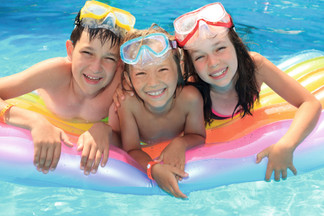Why Shock a Pool?
Published by Matt Fichera on 11/20/2019
Posted in: BioGuard, Quick Shock, Re-Fresh, S.O.S. Shock, Scorch, Scorch Plus, Shock, Smart Shock, T.K.O., Why Shock a Pool

We shock a pool to kill chloramines (the bad chlorine), rejuvenate the water, and return it to its pristine condition. It’s the intentional over-chlorination of the pool water for a certain period of time. Organic materials in the water like oils, lotions, sweat, algae and other things are continuously consumed by the chlorine in the pool water turning them into chloramines. The process of shocking involves using a large amount of chlorine all at once which allows the now elevated levels of chlorine to reach a break point where the organic materials’ demand has been satisfied. Beyond this break point the combined chlorine level has been satisfied helping to “burn off” (oxidize and sanitize) the chloramines. There’s two type of chlorines in pool water. They are: Free Chlorine and Total Chlorine.
These two types of chlorine should always be equal when you test for them. If these numbers separate it indicates a need to shock your pool water. The difference is called “combined” and whenever the difference is greater than .02 you need to shock the pool to bring it back “to order” by burning out the chloramines. When the numbers go back to equaling each other, the pool water will go back to being clear as many times it will have clouded over depending on how far away the separation of the numbers actually is.
For example: If you have 1.2 Total Chlorine and 1.0 Free Chlorine then you have .2 Combined and need to shock your pool. A good rule of thumb for a residential pool especially in hot weather is to shock your pool once a week and once every two weeks in milder weather.
Using one pound of shock per 10,000 gallons of pool water is the recommendation. So, if you have a 25,000-gallon pool you would need 2.5 pounds of shock to raise the chlorine level and effectively burn out the chloramines. Paying close attention to maintaining pH is also ideal throughout the shock process. If the pH is not within the range then the shock has its effectiveness reduced significantly.
There are a multitude of products that are offered with varying advantages and disadvantages.
Different Shocks and Products Available:
Cal Hypo (Calcium Hypochlorite) – Re-Fresh, T.K.O., Scorch, Burnout 3
Di-Chloro (Dichloroisocyanuric Acid) – S.O.S, Quick Shock, Smart Shock
Sodium Monopersulfate (MPS) (non-chlorine shock) – Scorch Plus
Sodium Hypochlorite – Liquid Super-Shock
Cal Hypo
This shock is the most powerful and fastest acting shock available. It’s granular based, quick dissolving, and is the most frequently used of all types of chlorine. The active ingredient range is between 58% and 73% and the pH is 7.2-7.8. Granular chlorine is unstabilized meaning that the product goes into the pool water and the chlorine level goes way up, burns out the chloramine and then goes out.
Pour it through the skimmer with the filter running, pre-mix it in a bucket and broadcast it across the pool, or use the pre-mix pouring it directly into the skimmer. With Cal Hypo you ideally want to shock at night and remain out of the pool for between 18 and 24 hours.
Cal Hypo Products We Offer:

|

|

|

|
|
T.K.O.
73% Active Ingredient |
Re-Fresh
68% Active Ingredient |
Scorch
68% Active Ingredient |
Bioguard Burnout 3
57.8% Active Ingredient |
Di-Chloro
This type of chlorine is stabilized and has cyanuric acid (CYA) in it to help it remain in the water for a longer period of time. This however, presents a problem as every time that you use Di-Chloro you are also adding stabilizer to the water. It is ideal to keep the water between 30ppm and 50ppm for CYA. If you are low on this number than utilizing the Di-Chloro is a great way to raise the CYA levels. You can also check the pH when using Di-Chloro as well. It’s fairly pH neutral. If you are using a granular chlorine, it’s typical to shock the pool at night and wait 24 hours to use the pool but with the shock products below they usually allow you to shock the pool and swim in 15 minutes.
Di-Chloro Products We Offer:
|
S.O.S. 15% Dichlor 72% Oxone |
Quick Shock 57% Active Ingredient |
Smart Shock 63% Active Ingredient |
Monopersulfate (MPS) (non-chlorine shock)
This type of shock is an alternative to chlorine. It’s an oxidizer meaning that it burns out chloramines but is not a disinfectant. It works great to rejuvenate your water, removing all organic materials without using chlorine. Using this is great because you can treat your water with it and swim in 5 to 10 minutes.
Monopersulfate Products We Offer:
Scorch Plus
Sodium Hypochlorite – Liquid Shock
This has 12.5% unstabilized chlorine by volume making it 87.5% inert. It has a pH of 12 so when you put this into your pool it will work to raise the pH level of the entire thing. A good rule of thumb on using this is 1 gallon for every 10,000 gallons of pool water.
Sodium Hypochlorite Products We Offer:
Super Shock
Our team would be happy to assist and answer any questions about shock or the shock process that you may have. Stop by one of or retail locations, give us a call, or contact us here. We thank you for your interest.







